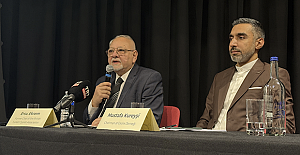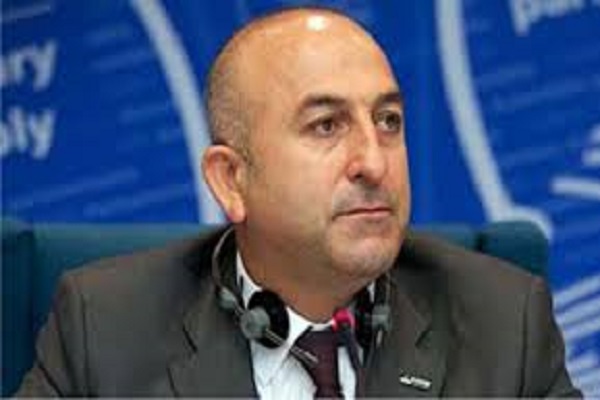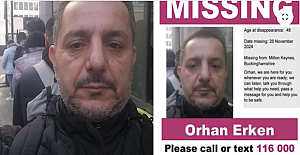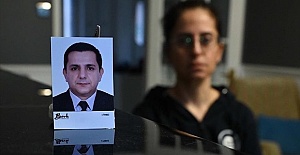Mehmet Ersoy, Chairman of the Turkish Grand National Assembly (TGNA) Internal Affairs Committee, Mehmet Tekelioğlu, Chairman of the EU Harmonisation Committee, Afif Demirkıran, Co-chairman of the EU-Turkey Joint Parliamentary Committee, Fahri Kasırga, Undersecretary of the Prime Ministry, Dr. Hikmet Tülen, Head of the Human Rights Institution of Turkey and Dr. Levent Korkut, member of the Board of Human Rights also participated in the meeting.
The 29th meeting of the RMG was held on 9 May, 2014, the anniversary of the Schuman Declaration, which is principal to the idea of European integration. We would like to extend our best wishes on this occasion to all citizens of Europe.
As Prime Minister Recep Tayyip Erdoğan stated, 2014 will be the EU year for Turkey during which many reforms will be implemented to further promote the fundamental rights and freedoms.
2013 has been a year of milestones in our determination to advance on the road to democracy. Prime Minister Erdoğan announced the Democratization Package on 30 September, 2013. This package is indisputably one of the boldest and most comprehensive reform packages in the history of our Republic. The package addresses the “political criteria” and Chapter on Judiciary and Fundamental Rights (Chapter 23), which are highly significant for Turkey’s EU accession process.
The dialogue on visa liberalisation was officially launched on 16 December 2013 in Ankara to introduce visa-free travel for Turkish citizens in three and half years at the latest, which would be the first step towards overcoming a significant psychological barrier between Europe and Turkey.
Turkey signed the Readmission Agreement with the EU also on the same date, taking an important step for Chapter on “Justice, Freedom and Security (Chapter 24).
2013 has brought concrete progress as a result of the resolute policies pursued during democratisation and reform process and has provided a new momentum for the accession negotiations. Chapter on Regional Policy and Coordination of Structural Instruments (Chapter 22) was the first chapter to be opened to negotiations on 5 November 2013 following three and half years of a stalling in the negotiations.
The commitment of our Government to the democratization process and the reforms was acknowledged in the 2013 Progress Report on Turkey by European Commission.
However, we have also observed with concern and regret the inexplicable response of international circles, and especially of the EU, to some recent incidents in Turkey.
It is beyond comprehension that EU Member States and EU officials still make statements serving only to further embolden certain circles to continue to exploit the accession process of Turkey while the fundamental rights and freedoms -such as freedom of expression and press, freedom of assembly and association, are further improved through the Democratization Package and other reform initiatives.
The EU’s confirmation that Turkey has already fulfilled the Copenhagen Political Criteria in itself testifies to the fact that the accession negotiations should proceed on a technical basis.
Especially in the past twelve years of the EU-Turkey relations on-going for more than fifty years, significant reforms have been carried outranging from fundamental political reforms to the inclusion of different segments of society in the accession process. Due to efforts by some EU Member States to hinder the process solely for domestic political considerations, the progress achieved has not been sufficiently reflected onto the current state of the accession negotiations.
Due to unilateral and political considerations set out by the Council of the European Union or by some EU Member States, seventeen chapters currently remain blocked.
Currently the most important issue regarding Turkey-EU relations is the political blockages, which are clearly unrelated to Turkey.
We invite the EU to open Chapter on Judiciary and Fundamental Rights (Chapter 23) and Chapter on Justice, Freedom and Security (Chapter 24)”, sharing the opinions on the necessity of opening these Chapters as expressed in 2013 Progress Report on Turkey by the European Commission and the two most recent European Parliament resolutions.
Our Government and our people sincerely expect the accession negotiations to progress on a fair basis.
We decided to prepare a “National Action Plan for Turkey’s EU Accession Process” for 2014-2016, under the coordination of the Ministry for EU Affairs and with the contribution of all relevant public institutions and organizations. This plan will lay down the necessary work to be carried out primarily on the basis of the negotiation chapters. With this plan, we will identify our priorities and monitor the current situation and the developments regarding the alignment with the acquis.
Hereby, we would like to share the decisions taken in the 29th Reform Monitoring Group meeting with the members of the press and our public.
We evaluated Turkey’s ratification of conventions that are of vital importance in the international arena. The conventions which Turkey has signed but not ratified yet, will be addressed in the forthcoming period. The ratification process of certain conventions, which aim at enhancing the rights and freedoms of the individuals through effective cooperation in the international arena, will soon be initiated.
Our Government has once again demonstrated its commitment to and determination for democratisation and the political reform process with the five Judicial Reform Packages and the Democratisation Package adopted in the past three years.
With the amendments introduced by the Democratisation Package: the ban on headscarves in public institutions was lifted; the school oath was no longer mandatory in primary schools-a similar change in secondary schools was introduced in the past year; the Foundations Assembly has taken the decision to register the immovables surrounding the Mor Gabriel Syriac Orthodox Monastery (Deyrülumur) under the name of the Foundation of the Monastery, upon its application to this end; the name of the “Nevşehir University” was changed to “Hacı Bektaş Veli University”; and a decision was taken by the Higher Education Council to establish the Roma Language and Culture Institute in Trakya University.
In addition, Law No. 6529 on the Amendment to Certain Laws to Enhance Fundamental Rights and Freedoms, introducing the necessary legal arrangements provided for in the Democratisation Package, entered into force on 13 March 2014.
This law has introduced provisions to relevant laws to further enhance standards of democracy and freedom, such as legislative arrangements on hate crimes, guarantees on respect for lifestyles, allowing for education in different languages and dialects in private schools, allowing political campaigns to be carried out in languages and dialects other than Turkish and expanding the scope of state aid for political parties.
Furthermore, we are continuing to decisively work on the Draft Law on the Protection of Personal Data and the Draft Law on Anti-Discrimination and Equality Board which are included in the scope of the Democratisation Package.
The Judicial Reform Strategy was prepared in 2009 by the Ministry of Justice and has been implemented to a great extent so far. It is currently being revised in a transparent and participatory manner.
Law No.6526, publicly named as the Fifth Judicial Reform Package, abolished the heavy criminal courts known as the “specially authorised courts” which had been established by Article 10 of the Anti-terror Law. The proceedings on-going at these courts were transferred to heavy criminal courts.
This Law also reduced the maximum detention period of ten years provided for in Article 10 of the Anti-terror Law to five years. The conditions required to take a decision for the seizure of immovable properties, forfeiture of claims and rights, wiretapping and audio surveillance, assignment of a covert investigator and technical surveillance and monitoring have been made more stringent, and the periods for the implementation of these measures have been decreased. The criterion of “substantial evidence” has been introduced for a decision on investigative measures, such as custody, detention and search. Furthermore, it has become compulsory to provide the suspect with a copy of all the data on his computer when the computer data is seized, irrespective of his request. Lifting the restriction on the examination of the case file by the defendant with a view to strengthening the defence is one of the most important amendments introduced by this Law.
As a result of these reforms, the backlog of the courts has decreased and the pre-trial detention rate has been reduced to 14%. Turkey has achieved greater progress in this area than many other EU Member States.
It is essential that the public should be informed accurately about the recent reports issued regarding the “journalists under arrest”. All these reports containing diverse data have been prepared on the basis of information obtained from persons involved, their lawyers and organizations carrying out activities in this area. There are the names of 44 journalists under arrest on the most recent list issued by one of these organizations. When these names and the data provided by the prisons are compared, it is seen that 18 persons were convicted by the courts. The trials of 11 detainees are currently on-going. 14 persons were released on different dates and regarding one person, there is no official record for being held in in prison. The acts for which the journalists were convicted and the incriminations in the indictments of journalists whose trials are on-going indicate that they were not charged based on their professions.
The necessary arrangements will be made after the Constitutional Court issues its reasoned decision regarding the annulment of a number of provisions of the Law on High Council of Judges and Prosecutors (HCJP).
We would like to reiterate that it is not just to disregard the reforms carried out in the past twelve years to enhance the rule of law, separation of powers and the impartiality and independence of the judiciary. Furthermore, any criticisms to the recent amendments to the Law on the High Council of Judges and Prosecutors, prior to observation of results in implementation, is not fair since the legislation is in fact in parallel with many EU Member States.
We will continue decisively with the judicial reforms so as to ensure the impartiality of the judiciary, with consideration to both internal and external independence.
Action Plan on the Prevention of Violations of the European Convention on Human Rights was prepared by the Ministry of Justice to identify measures to eliminate problems in areas which have been subject to violation decisions by the European Court of Human Rights (ECtHR). The action plan also identifies activities and arrangements as well as the relevant institutions. This action plan was published in the Official Gazette of 1 March 2014.
Thus, all of the unofficial opening benchmarks for Chapter on Judiciary and Fundamental Rights (Chapter 23) have been fulfilled with the adoption of this Action Plan. Close monitoring of the implementation of the action plan in the forthcoming period is essential to achieving its established objectives.
Legislative provisions that previously restricted the freedom of expression and freedom of press have been aligned with international human rights standards with the Third and Fourth Judicial Reform Packages. It can be observed that judges and prosecutors are starting to take a more libertarian approach to these areas as a result of many projects and awareness-raising activities, one of which is the “Project on Freedom of Expression and Media in Turkey” which has been finalised in cooperation with the Council of Europe. The effects of these steps on implementation will be closely monitored and necessary measures will be taken in line with the Action Plan on the Prevention of the Violation of the European Convention on Human Rights to ensure freedom of expression and freedom of the media in the broadest sense.
The number of applications lodged with the Human Rights Compensation Commission - established within the Ministry of Justice and functioning since February 2013 - has reached a total number of 5415. The Commission has taken decisions on 4040 of these applications. The ECtHR ruled that applications should first be lodged with the Human Rights Compensation Commission and found 4755 applications (the Court received) inadmissible on these grounds. The field of competence of the Commission was broadened by the Council of the Ministers Decree of 16 March 2014. This is expected to result in 1700 more applications being removed from the agenda of the ECtHR. Turkey has moved down from second ranking to fifth according to the statistics issued by the ECtHR on 28 February 2014 with respect to pending files. Furthermore, Turkey was fifteenth among the 47 member states with respect to applications in 2012 (a ratio of 1.22 per 10 000people). In 2013, this ratio decreased to 0.47 per 10 000 people, with Turkey ranking as the thirtieth country.
The Council of Ministers Decree of 28 January 2014 gave the National Human Rights Institution of Turkey the mandate to act as the “national preventive mechanism”, which is provided for in the Optional Protocol to the UN Convention against Torture and Other Cruel, Inhuman or Degrading Treatment or Punishment (OPCAT). Administrative and capacity-building work is currently underway in order for the National Human Rights Institution of Turkey to carry out its duties as the designated body.
The draft Law on the Establishment of the Law Enforcement Monitoring Commission, prepared by the Ministry of Interior, is currently on the agenda of the TGNA. The Commission has been established for an effective and rapid investigation of the claims and complaints on human rights violations about law enforcement personnel.
The recent increase in the incidences of sexual assault and exploitation of children, which is a particularly sensitive public issue, was another item on the agenda of this RMG meeting. A draft law, prepared to remedy problems related to the offences listed under the section titled “Offenses regarding sexual inviolability” in the Turkish Criminal Code by introducing deterrent penalties, will be submitted to the TGNA without delay.
The draft Law on the Approval of the Optional Protocol for the Convention on the Rights of Persons with Disabilities is currently on the agenda of the TGNA. This law will be complementary to the work currently underway to ensure that all our disabled citizens are able to fully exercise their rights and freedoms.
Work for the protection of victims of violence is currently being carried out by a technical commission established under the Ministry of Justice.
Freedom of assembly and association is one of the issues addressed in the Democratisation Package.
Work is currently underway to improve standards and practice related to the right to assembly and association in line with the Action Plan on the Prevention of Violations of the European Convention on Human Rights.
We believe that benefiting from all EU assistance, including EU financial instruments other than IPA, in order to share the financial burden incurred by the implementation of the Readmission Agreement signed between Turkey and the EU, is pursuant to the principle of burden-sharing in the fight against irregular migration.
Work is currently on-going to improve the administrative and institutional capacity of the Directorate General of Migration Management, established by the Law on Foreigners and International Protection, which entered into force on11 April 2013.Work is currently underway on the changes provided for in this law.
Preparations continue for the Draft Law on Prevention of Trafficking in Human Beings and Protection of Victims under the coordination of the Ministry of Interior.
Work by the Ministry of Interior on the draft Law on Border Security is on-going.
The Law on Approval of Ratification of the Council of Europe Convention on Cybercrime was published in the Official Gazette on 2 May 2014. Having ratified the convention, Turkey will be able to integrate with the common legal area established in the framework of the Council of Europe regarding the fight against cybercrime.
Prime Minister Recep Tayyip Erdoğan released a message of condolence on 23 April 2014 which addressed directly for the first time our Armenian citizens and all Armenian people. This message which was welcomed by the international community has been a milestone in terms of its content and timing. The message reflected the affection and empathy of a self-confident state, embracing its history in all aspects.
In order to ensure the continuity of the political reform process–a fundamental element of our determination to advance Turkey beyond the level of contemporary civilizations -and to ensure and monitor the effective implementation of the reforms, the 30th Meeting of the Reform Monitoring Group, has been decided to be held in July 2014 in Gaziantep.


 After Nesil Caliskan a by-election will be held in Jubilee ward in Enfield
After Nesil Caliskan a by-election will be held in Jubilee ward in Enfield Publishing the analysis, Labour’s Cllr Ergin Erbil said Everybody in Enfield deserves basic rights
Publishing the analysis, Labour’s Cllr Ergin Erbil said Everybody in Enfield deserves basic rights Gaza-Israel conflict Statement from Cllr Ergin Erbil, Leader of Enfield Council
Gaza-Israel conflict Statement from Cllr Ergin Erbil, Leader of Enfield Council Cllr Ergin Erbil was elected as the new Leader of Enfield Council
Cllr Ergin Erbil was elected as the new Leader of Enfield Council Cold weather health alerts issued ahead of snow
Cold weather health alerts issued ahead of snow London defies weather with spectacular fireworks display to ring in 2025
London defies weather with spectacular fireworks display to ring in 2025 Alim Karaca, who hosted Bill Gates, Jeff Bezos, Trump, talked about Fethiye
Alim Karaca, who hosted Bill Gates, Jeff Bezos, Trump, talked about Fethiye History of the Turkish Cypriot People symposium held in London
History of the Turkish Cypriot People symposium held in London Footballers are celebrating after Enfield Council officially opened a pitch
Footballers are celebrating after Enfield Council officially opened a pitch  Pep Guardiola's Manchester City beaten by Juventus
Pep Guardiola's Manchester City beaten by Juventus Chelsea to meet Arsenal in Sunday's London derby
Chelsea to meet Arsenal in Sunday's London derby Fenerbahce vs Manchester United Predicted line-ups! Jose Mourinho faces former side
Fenerbahce vs Manchester United Predicted line-ups! Jose Mourinho faces former side UK economy had zero growth between July and September
UK economy had zero growth between July and September Shape the future of housing services with The Enfield 500
Shape the future of housing services with The Enfield 500 DOUBLE-CAB PICKUPS TO BE CLASSED AS CARS UNDER NEW HMRC POLICY
DOUBLE-CAB PICKUPS TO BE CLASSED AS CARS UNDER NEW HMRC POLICY Guide to Selling Hoodies with Imprinted Book Quotes
Guide to Selling Hoodies with Imprinted Book Quotes














